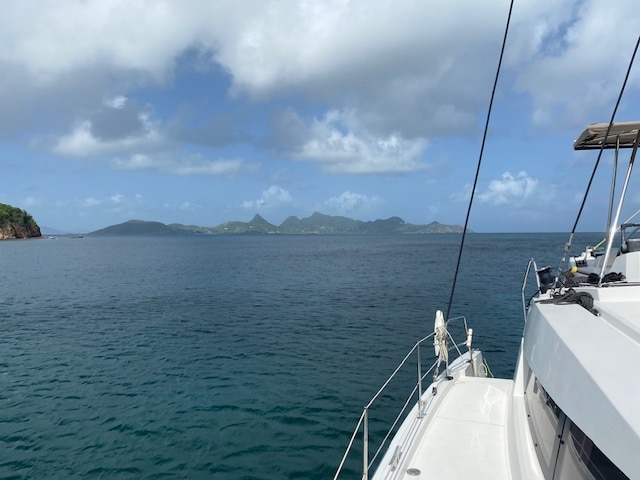
Can changes in latitude bring changes in aptitude, at least when it comes to drawing the lines between what I learned from a recent sailing vacation in St. Vincent and the Grenadines and meeting planning? Yes, yes they can!
As all-too-often happens, I had a hard time turning off my meeting-planning radar during a recent vacation bareboat (no captain or crew, just the two of us) charter my significant other and I took to St. Vincent and the Grenadines. While the two activities would seem to share basically nothing, I couldn’t help but notice some parallels as we hoisted our sails on View Finder, a lovely two-year-old Bali 4.1 catamaran we chartered for a 10-day cruise.
Managing the generation gap: No, not the age kind — we’re talking actual generators. We had chartered this specific cat, even though it was a lot more boat than we needed for just the two of us, in large part because it had a generator on board, called a genset, we could use to have AC at night — a serious nice-to-have in the tropics in July! However, when we were going over the details during our boat briefing, we found out that the genset was busted and the parts they received were not the parts they needed to fix it (queue the all-too-familiar sad story about supply chain snafus). There were no other boats available, and not much anyone could do about our malfunctioning genset, so we resigned ourselves to sleeping on deck to catch the evening breezes until the inevitable night-time squalls drove us into the pontoon for steamy, sweaty shelter.
On the plus side, while we weren’t able to wrangle an actual rebate on the boat charter fee, we hadn’t yet ponied up for the provisioning (the food, water and grog we had pre-ordered that was already loaded onto the boat so we didn’t have to schlep around to the grocery store when we got there). We also hadn’t yet paid for boat internet, which turned out to be an iPad Mini hot spot. So we ended up getting greased for both of those items instead, which was a reasonable compromise for us and the company.
Meeting planning tack: It’d be nice if everything was perfect when you arrive on site for your event, but how often does that happen? If something that’s fairly vital to your attendee experience looks like it went the way of our genset at the last minute, have a Plan B in mind if at all possible. If this particular snafu was not one that had crossed your mind, communicate early and often with your supplier to see what they can do to make you whole or, if that’s not possible, what financial incentives they can offer to make things right. This would include, as it did in our case, F&B discounts and internet, which are often big pain points for planners, though I doubt you’d want to run your event on an iPad hot spot!
Off season pros and cons: While we had sailed St. Vincent and the Grenadines a half dozen times before, it had always been in January, when the winds and seas can be pretty challenging. While that makes for fun sailing, we wanted to see what it’s like in the off-season’s milder weather and smaller sailing crowds (and lower charter boat fees, of course). My spouse had been watching the annual liveaboard migration via AIS, a marine tracking system that shows where boats are globally (at least, where the AIS-enabled boats are). Most insurance companies require that boat owners take their Caribbean-based boats somewhere safely south of the main storm zone for hurricane season, which means a lot of people who live on their boats take them to Grenada or beyond until the storm season ends in the fall — and the tracking site showed the liveaboard fleet was in fact migrating through right before we headed down to the islands.
We were looking forward to quiet, but maybe not as quiet as it ended up being, even with a few liveaboards still in the ‘hood! We had to make reservations if we wanted to go out to dinner not to make sure they could have a table available, but rather to ensure that the restaurant would be open. In fact, we were almost always the only table when we did go off the boat for dinner, which was pretty weird for us and must have been incredibly not cost-effective for the restaurants.
Meeting planning tack: Yes, there are deals to be had when you book in a destination’s off- or shoulder season, but be sure to explore exactly what the tradeoffs might be. Some local venues you may want to use for off-site events and receptions may be closed for the season, and even some favorite foods may be unavailable (lobster season ended before we got to St. Vincent, but we knew that and weren’t disappointed).
 Always be prepared to make mid-course corrections: We were enjoying some hang time in Chatham Bay on Union Island the morning after a nice dinner at one of those almost deserted restaurants when we heard from the charter company that a good-sized blow was heading our way. Instead of heading to Petit St. Vincent as we had been planning, we heeded the manager’s very strongly worded recommendation that we head back to Canouan’s new Sandy Lane Yacht Club marina, where we could be well protected from the tropical wave’s wrath. And, once tied up to the slip, we could plug into shore power and have a night with AC — yay. OK, not so yay. Turns out our shore-power cord and plug also were DOA, as well as too short to reach the outlet without turning the boat stern-to-the-wind, which we had done before we realized it wouldn’t work anyway.
Always be prepared to make mid-course corrections: We were enjoying some hang time in Chatham Bay on Union Island the morning after a nice dinner at one of those almost deserted restaurants when we heard from the charter company that a good-sized blow was heading our way. Instead of heading to Petit St. Vincent as we had been planning, we heeded the manager’s very strongly worded recommendation that we head back to Canouan’s new Sandy Lane Yacht Club marina, where we could be well protected from the tropical wave’s wrath. And, once tied up to the slip, we could plug into shore power and have a night with AC — yay. OK, not so yay. Turns out our shore-power cord and plug also were DOA, as well as too short to reach the outlet without turning the boat stern-to-the-wind, which we had done before we realized it wouldn’t work anyway.
Around 10:30 that night as the wind was howling and the rain driving, my spouse was sleeping soundly while I read in the cabin. Then I heard someone outside asking permission to come aboard. What the heck? It turns out our main sail was getting backwinded and blowing up out of the sail bag, which if it got enough area free, could have caused some serious problems. Olivier, who was on the catamaran in front of us, had noticed it and came to help. After some clambering around in the sail bag and makeshift tie-downs using the reef lines, the sail was secured, and Olivier went back to his boat. We made sure to find him the next day to thank him, but as his wife said, helping each other out is just what sailors do. How I wish the rest of the world operated on that philosophy!
Meeting planning tack: Again, it’s essential to have pre-charted your Plan B (and possibly C, D and E). And always listen to the local wisdom — we’d been through plenty of big winds and storms, but this one was coming from an unusual direction and our usual coping strategies would have left us vulnerable. While neither of us particularly enjoyed our enforced campout at the marina for two days, we were glad to be tucked in safe and sound until the storm passed. As for Olivier’s help? We should always be grateful for the kindness of strangers!
Show the locals some love: One really awesome thing about the Grenadines is that there’s always someone eager to lend a helping hand. People hang out around the harbor entrances in their dinghies just waiting to escort visiting boats to their moorings, and then help you moor or anchor in just the right spot. While this can be a bit tricky — rules for how this works in harbors in the National Marine Park are different than areas that aren’t — but almost all those who rushed to our aide were OK with a small tip and/or a beverage of their choice.
Meeting planning tack: While a few East Caribbean dollars (ECs) and a Diet Coke or Hairoun beer probably won’t make your local volunteers feel the love, find ways that will make them know how much you appreciate their being at the airport to greet your attendees, manning the information booths at the show, etc. It doesn’t have to be a big, extravagant gesture; even a small token of appreciation can go a long way.
COVID confusion may still be lingering: While the islands had lifted all COVID-era restrictions by the time we sailed into the area in late June, some pandemic-era challenges apparently remained. When we had a problem with one of the engines that we couldn’t figure out on our own, we called “the guy” on the back of the manual the charter company gave us to see if he could come fix it. The only problem was that guy said he had been laid off during COVID and no longer worked for the company. Which apparently was news to the company, who again gave us his number to call when we got in touch with them about it. After some back and forth, somebody — a different guy — did end up coming out to fix the problem (just a blown fuse, phew), but the whole thing was a bit head-scratching at the time.
Meeting planning tack: Check all your contracts to make sure that whoever “the guy” is in your venue and at your suppliers is, in fact, currently working for the company. And check to make sure everything else in your documents is also up to date. Things have changed and not everyone has updated all their materials to reflect those changes.
Life is a carnival: I wish I had paid more attention to what was happening locally before we headed down — I would have wanted to add an extra day or two to check out Vincy Mas, St. Vincent’s two-week-long celebration of the local culture, traditions and heritage. As we were checking out at the charter boat office and getting ready to drag ourselves off to the new airport to fly back to Boston, a woman in the office told me all about the costumes, parades, music, colors and dances that take place at different themed parties throughout the carnival weeks. On the flip side, I’m glad we missed the carnivals taking place on other Grenadine islands, including Union Island and Bequia, we visited on our trip. While I’m sure they would have been a blast as well, we heard that pretty much everything shuts down while people party, which wouldn’t have been super convenient for when we had to do re-provisioning stops.
Meeting planning tack: I know you know this, but check with your local CVB to see what else is going on in your destination over your dates that could affect traffic, local services, housing availability, etc. You may find things happening in the area that you would want to incorporate into your attendees’ experience, and you may find that some of those happenings will require a little additional logistical planning around on your part.
What in your “real” life have you found informs, or reenforces, your meeting planning strategies? Share your stories by emailing [email protected].
You May Also Be Interested In…
Events as Seen Through a Marketing Lens
What Will the Meeting Room of the Future Look Like?
How to Create Goosebump Events










